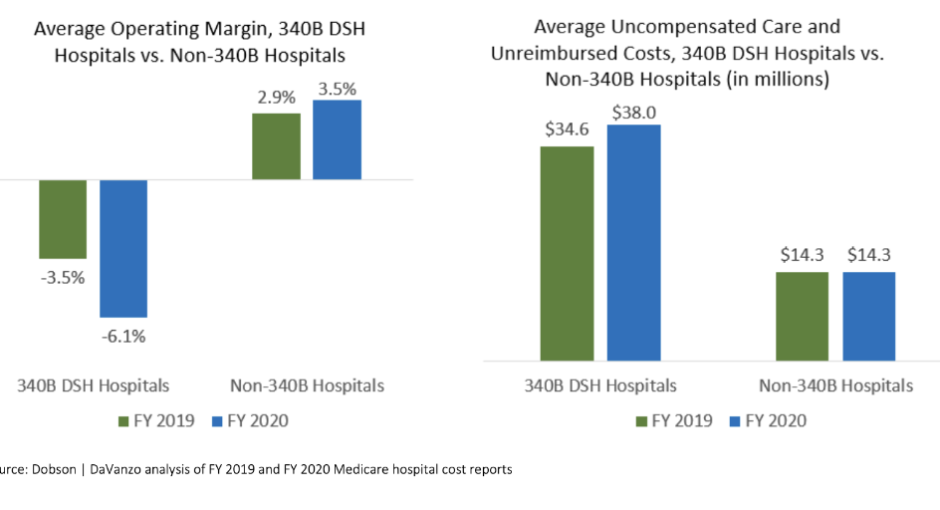340B disproportionate share hospitals provided more uncompensated and unreimbursed care during 2020 despite a decline in operating margins associated with the COVID-19 pandemic, a new hospital-funded study shows.
The paper by Dobson DaVanzo for hospital group 340B Health compared 340B DSH hospitals with non-340B hospitals on operating margins and provision of uncompensated and unreimbursed care during the pandemic’s first year, using data from Medicare cost reports hospitals filed in 2019 and 2020. The study defined uncompensated and unreimbursed care as charity care, financial assistance, bad debt, and public program shortfalls. It said that sum is “a measure of a hospital’s provision of services to individuals with low incomes.”
340B Health reported that the average operating margin for 340B DSH hospitals fell from -3.5% in 2019 to -6.1% in 2020, while the average margin for non-340B hospitals rose from 2.9% to 3.5%. 340B DSH hospitals’ average uncompensated and unreimbursed care costs rose from $34.6 million to $38.0 million while such costs remained steady for non-340B hospitals at $14.3 million.
The paper noted that federal COVID-19 emergency relief funds are not considered operating revenue on Medicare costs reports. The researchers said to gauge the emergency aid’s effect on hospital finances, they recalculated operating margins as if the aid were operating revenue. Folding the emergency aid into operating revenue did not change average difference in financial performance between 340B and non-340B hospitals in 2020, they said.
“The historic COVID-19 public health emergency significantly hit 340B hospitals,” said 340B Health President and CEO Maureen Testoni. “Yet, true to their mission, these safety-net hospitals stepped forward to provide care to those who could not afford it. This report is the latest demonstration that 340B savings are going toward care for patients living with low incomes, as Congress intended.”
The drug industry-led group AIR 340B released a report in February by Avalere Health that found that 65% of 340B DSH hospitals provide less charity care than the national average for all short-term acute care hospitals. Twenty-nine percent of 340B DSH hospitals accounted for 80% of the total charity care provided by all 340B DSH hospitals in 2019, the group said.
The 340B PAUSE Act, a bill introduced in the U.S. House in 2017, would have required 340B DSH, children’s, and free-standing cancer hospitals to publicly report their total annual charity care costs at the child-site level.
Hospital groups say focusing narrowly on charity care ignores 340B hospitals’ provision of uncompensated care, Medicare and Medicaid’s underpayments for hospital care, and other ways that 340B hospitals use savings and income derived from 340B to advance safety-net healthcare.


